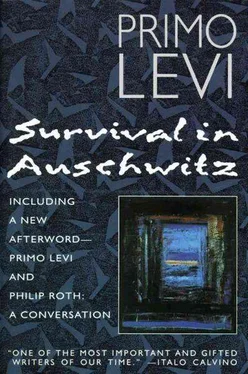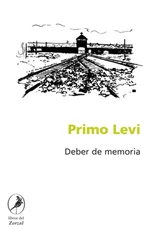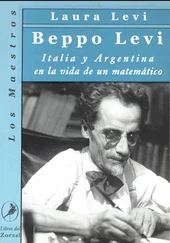No, I honestly do not feel my companion of today, harnessed with me under the same load, to be either enemy or rival.
He is Null Achtzehn. He is not called anything except that, Zero Eighteen, the last three figures of his entry number; as if everyone was aware that only a man is worthy of a name, and that Null Achtzehn is no longer a man. I think that even he has forgotten his name, certainly he acts as if this was so. When he speaks, when he looks around, he gives the impression of being empty inside, nothing more than an involucre, like the slough of certain insects which one finds on the banks of swamps, held by a thread to the stones and shaken by the wind.
Null Achtzehn is very young, which is a grave danger. Not only because boys support exhaustion and fasting worse than adults, but even more because a long training is needed to survive here in the struggle of each one against all, a training which young people rarely have. Null Achtzehn is not even particularly weak, but all avoid working with him. He is indifferent to the point of not even troubling to avoid tiredness and blows or to search for food. He carries out all the orders that he is given, and it is foreseeable that when they send him to his death he will go with the same total indifference.
He has not even the rudimentary astuteness of a draught-horse, which stops pulling a little before it reaches exhaustion: he pulls or carries or pushes as long as his strength allows him, then he gives way at once, without a word of warning, without lifting his sad, opaque eyes from the ground. He made me think of the sledge-dogs in London’s books, who slave until the last breath and die on the track.
But as all the rest of us try by every possible means to avoid work, Null Achtzehn is the one who works more than all. It is because of this, and because he is a dangerous companion, that no one wants to work with him; and as, on the other hand, no one wants to work with me, because I am weak and clumsy, it often happens that we find ourselves paired together.
As we come back once again from the store, with hands empty, dragging our feet, an engine whistles briefly and cuts off our path. Happy at the enforced delay, Null Achtzehn and I stop; bent and in rags, we wait for the wagons to pass slowly by.
… Deutsche Reichsbahn. Deutsche Reichsbahn. SNCF. Two huge Russian goods wagons with the hammer and sickle badly rubbed off. Then, Cavalli 8, Domini 40, Tara, Portata : an Italian wagon… Oh, to climb into a corner, well-hidden under the coal, and to stay there quiet and still in the dark, to listen endlessly to the rhythm of the wheels, stronger than hunger or tiredness; until, at a certain moment, the train would stop and I would feel the warm air and the smell of hay and I would get out into the sun; then I would lie down on the ground to kiss the earth, as you read in books, with my face in the grass. And a woman would pass, and she would ask me ‘Who are you?’ in Italian, and I would tell her my story in Italian, and she would understand, and she would give me food and shelter. And she would not believe the things I tell her, and I would show her the number on my arm, and then she would believe…
…It is over. The last wagon has passed, and as if the curtain had been raised, the pile of cast-iron supports lies before our eyes. The Kapo on his feet at the pile with a switch in his hand, the wan companions who come and go in pairs.
Alas for the dreamer: the moment of consciousness that accompanies the awakening is the acutest of sufferings. But it does not often happen to us, and they are not long dreams. We are only tired beasts.
We are once again at the foot of the pile. Mischa and the Galician lift a support and put it roughly on our shoulders. Their job is the least tiring, so that they show excess zeal to keep it: they shout at companions who dawdle, they incite them, they admonish them, they drive on the work at an unbearable pace. This fills me with anger, although I already know that it is in the normal order of things that the privileged oppress the unprivileged: the social structure of the camp is based on this human law.
This time it is my turn to walk in front. The support is heavy but very short, so that at every step I feel behind me Null Achtzehn’s feet which tread on mine, as he is unable or cannot be bothered to keep in step.
Twenty steps, we have arrived at the railroad, there is a cable to climb over. The load is badly placed, something is not right, it seems to be slipping from my shoulder. Fifty steps, sixty. The door of the store: still the same distance to walk and we can put it down. It is enough, I cannot go any further, the load is now weighing entirely on my arm. I cannot stand the pain and exhaustion any longer: I shout, I try to turn around, just in time to see Null Achtzehn trip and throw everything down.
If I had still had my agility of earlier days I could have jumped back: instead, here I am on the ground, with all my muscles contracted, the wounded foot tight between my hands, blind with pain. The corner of the piece of iron had cut across the back of my foot.
For a moment all is blank in the giddiness of pain. When I manage to look around, Null Achtzehn is still there on his feet, he has not moved, with his hands in his sleeves, his face expressionless, he does not say a word. Mischa and the Galician arrive, speaking Yiddish to each other, they give me incomprehensible advice. Templer and David and the others arrive: they profit from the distraction to stop work. The Kapo arrives, he distributes kicks, punches and abuse, and the comrades disperse like chaff in the wind. Null Achtzehn puts his hand to his nose and blankly looks at it, dirty with blood. I only recieve two blows on the head, of the sort that do no harm but simply stun.
The incident is closed. It is proven, for good or bad, that I can stand up, so that the bone cannot be broken. I do not dare to cut the boot open for fear of wakening the pain again, and also because I know that the foot will swell and I will be unable to put the boot on again.
The Kapo sends me to take the place of the Galician at the pile, and the latter, glaring at me, takes his place alongside Null Achtzehn; but by now the English prisoners have passed, it will soon be time to return to the camp.
During the march I do my best to walk quickly, but I cannot keep up the pace. The Kapo picks out Null Achtzehn and Finder’ to help me as far as the procession in front of the SS, and finally (fortunately there is no roll-call this evening) I am in the hut and I can throw myself on the bunk and breathe.
Perhaps it is the heat, perhaps the fatigue of the march, but the pain has begun again, together with a strange feeling of humidity in the wounded foot. I take off my shoe: it is full of blood, by now congealed and kneaded into the mud and rags of the cloth I found a month ago, and which I use as a foot-pad, one day on the right, one day on the left foot.
This evening, after soup, I will go to Ka-Be.
Ka-Be is the abbreviation of Krankenbau, the infirmary.
There are eight huts, exactly like the others in the camp, but separated by a wire fence. They permanently hold a tenth of the population of the camp, but there are few who stay there longer than two weeks and none more than two months: within these limits they are held to die or be cured. Those who show signs of improvement are cured in Ka-Be, those who seem to get worse are sent from Ka-Be to the gas chambers. All this because we, fortunately, belong to the category of ‘economically useful Jews’.
I have never been to Ka-Be nor to the clinic, and it is all new to me. There are two clinics, medical and surgical. In front of the door, exposed to the night and the wind, there are two long shadows. Some only have need of a bandage or a pill, others ask to be examined; some show death in their faces. Those at the front of both rows are already barefoot and ready to enter. Others, as their turn to enter approaches, contrive in the middle of the crush to loosen the haphazard laces and wire threads of their shoes and to unfold the precious foot-pads without tearing them; not too early, so as not to stand pointlessly in the mud in bare feet; not too late, so as not to lose their turn to enter, because it is rigorously forbidden to enter Ka-Be with shoes. A gigantic French Häftling, sitting in the porch between the doors of the two clinics, enforces respect for the prohibition. He is one of the few French officials of the camp. And do not think that to spend one’s day among the muddy and broken shoes is a small privilege: it is enough to think of how many enter Ka-Be with shoes, and leave with no further need of them…
Читать дальше












